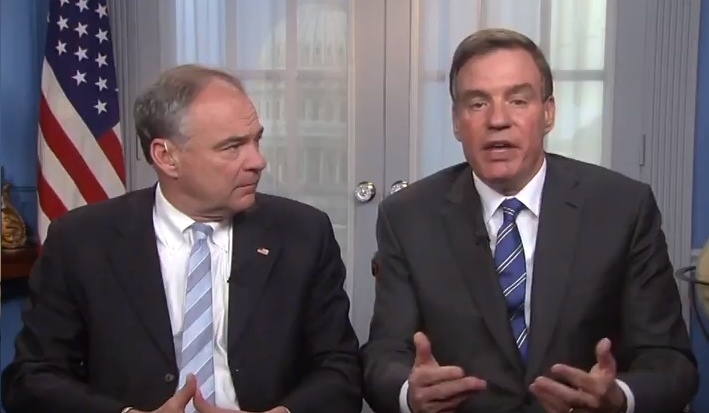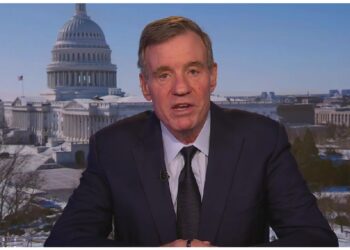See below for statements by Senators Mark Warner and Tim Kaine on the passage last night of
STATEMENT OF U.S. SEN. MARK R. WARNER
~ On Senate passage of coronavirus relief legislation ~
WASHINGTON – U.S. Sen. Mark R. Warner (D-VA) released the following statement after voting in favor of a $2 trillion bipartisan package to provide financial relief to businesses and families as well as hospitals and local governments during the novel coronavirus (COVID-19) pandemic:
“This is not the first step Congress has taken to deal with the COVID-19 pandemic, nor will it be the last. This bill provides significant financial relief to our families and businesses struggling with the effects of widespread closures and other public health measures. It greatly expands access to unemployment benefits – including, for the first time, gig workers, contractors and the self-employed – and includes tax credits and other incentives I negotiated with the Trump Administration to help small businesses keep workers on payroll and keep them from going out of business during this crisis. This bipartisan bill also includes a massive infusion of resources for hospitals, frontline caregivers, and states and localities dealing with the brunt of COVID-19. I strongly urge the House of Representatives to pass this bill without delay, so that we can get this urgently-required relief to those who so badly need it.
“This is a challenge unlike any we have faced in recent memory, but I believe that we as a country can and will get through this together. I will remain in close touch with state, local and health officials to ensure that we are doing everything possible to provide the resources needed to fight the coronavirus.”
Previously, the President signed a bipartisan $8.3 billion emergency funding bill that directed needed resources to federal, state and local agencies responding to coronavirus. This legislation immediately provided Virginia with $13.3 million in federal funding to help cover the costs of preparations for this public health emergency. It also included language based on Sen. Warner’s CONNECT for Health Act of 2019, which reduces restrictions on the use of telehealth for public health emergency response, as well as $500 million to facilitate its implementation.
On March 18, the President signed a second bipartisan coronavirus response bill that focused on the immediate economic impact of the coronavirus. This legislation expanded paid sick leave to many Americans, cut restrictions on unemployment insurance for workers who have lost their jobs or had their hours cut, and guaranteed freed coronavirus testing. It also included significant emergency funding for Medicaid, nutrition assistance, state unemployment programs, and coronavirus testing at Department of Veterans Affairs medical centers.
Today’s legislation provides for $1,200 in direct payments to most Americans, and includes billions of dollars in lending and grant programs designed to help businesses, workers and municipalities survive this crisis, along with strong transparency and accountability measures to make sure that federal funding doesn’t go towards stock buybacks or bonuses for corporate executives. Today’s bipartisan bill also provides for $150 billion for hospitals and other public health infrastructure, part of an unprecedented investment that Sen. Warner and other Democrats fought to include as our frontline responders struggle under the weight of the coronavirus pandemic. It also includes an important change to existing tax policy allowing employers, for the first time, to use pre-tax dollars to help pay down employees’ student debt – provision modeled after Sen. Warner’s bipartisan Employer Participation in Repayment Act.
A more comprehensive list of Sen. Warner’s work to protect Americans amid the coronavirus outbreak is available here.
KAINE STATEMENT ON SENATE PASSAGE OF CORONAVIRUS ECONOMIC RELIEF PACKAGE
WASHINGTON, D.C. – U.S. Senator Tim Kaine released the following statement after the Senate approved a bipartisan coronavirus (COVID-19) economic relief package. The legislation includes Kaine’s priorities to provide direct payments to Americans, protect small businesses, expand access to child care, provide much-needed assistance to state and local governments, strengthen our health care system, ensure that funding for larger businesses is used to protect their employees, fund improvements to the nation’s public health data systems, help manufacturers affected by this crisis, expand unemployment assistance, put a temporary moratorium on evictions and foreclosures, support schools, strengthen America’s medical supply chain, increase nonprofit funding for maternal health, and increase funding for community action agencies.
“I’m so proud that Senate Democrats stood together and made sure that the bill we passed today will backstop the American economy by protecting workers and their families. Compared to the partisan proposal that the GOP hoped to jam through, this bill is far better for working people and the small businesses that make up the heart of our economy. It makes sure that funds to large businesses cannot be used to raise executive pay or for stock buybacks and guarantees transparency so that all Americans can know immediately who is receiving help. Finally, it is a Marshall Plan for the American health care system as it deals with a pandemic.
“These gains for regular Americans and our health care system would not have occurred had Democrats just gone along with the GOP proposal. There was enormous pressure to simply vote on a bill and be done, but we stayed on task until we got the details right.
“We now have to make sure the three bills we have passed in recent weeks are implemented promptly and fairly. And we need to keep our eye on our number one priority: getting through this health crisis by following science-based guidance. We lost 6-8 weeks at the front end of this pandemic due to the President choosing to downplay the threat of COVID-19 even as other nations like South Korea and Australia were ramping up testing and production of critical medical supplies. We cannot waste any more time on foolishly denying the scope of the problem.
“For America to get back to work, and for Americans to get past their natural fears and anxieties, we have to be smart from this point forward as we battle this virus. All people have a role to play in this by practicing social distancing to protect one another. I have confidence that Virginians and all Americans will meet this challenge.”
The following Kaine priorities were included in the package:
- Direct payments to Americans: The legislation includes direct cash payments to all low- and middle-income Americans: $1,200 per single filer and $2,400 for joint filers, with an additional $500 per minor dependent. Kaine and his Democratic colleagues successfully called for cash relief that does not leave out America’s most vulnerable families, while the initial Republican proposal provided insufficient relief for these households.
- Small business funding: The legislation provides nearly $350 billion in funding for forgivable small business loans. Funding will be provided through local banks, and can be used to cover payroll, rent, mortgage interest, utilities, and other expenses. The portion that is forgiven will be scaled related to how many workers the business retains through the crisis.
- Expand access to child care: The legislation includes Senator Kaine’s proposal with Senator Todd Young to increase funding, flexibility, and eligibility for the Child Care & Development Block Grant (CCDBG) to help ensure health care providers and other essential workers have access to child care during the pandemic.
- State and local coronavirus relief fund: The legislation includes a $150 billion fund to support state, local, and tribal area efforts to address COVID-19. Funding will be provided directly to states, counties, and tribal areas.
- Historic investment in the health care system: Democrats fought for and secured a $150 billion Marshall Plan for the health care system to support hospitals and other health care providers impacted by COVID-19 with necessary personal protective equipment, testing supplies, infrastructure, and more.
- Guardrails for large business assistance: Democrats were able to secure additional guardrails on loans made to larger businesses, including restrictions on stock buybacks and protections that will lead to more workers being maintained on the payroll. Additionally, funding provided under this section will be subject to strict transparency and accountability requirements, including the establishment of a new Inspector General to oversee distribution, usage, and repayment of funds.
- Data modernization: The legislation includes $500 million for public health data modernization, which Sen. Kaine has long championed. Last year, he introduced with Senators Isakson and King the Saving Lives Through Better Data Act, bipartisan legislation to modernize public health data infrastructure so clinicians, state health departments, and the CDC can work together more quickly and seamlessly to identify and respond to health threats like the coronavirus.
- Help for American manufacturers: The legislation includes key provisions of bipartisan legislation Kaine introduced with Senator Chris Coons to help Manufacturing Extension Partnership (MEP) centers, including the Commonwealth’s MEP affiliate Virginia GENEDGE, stay open during the COVID-19 crisis and beyond. MEP centers provide critical resources for small and medium manufacturers.
- Expand unemployment assistance: The legislation includes key provisions of legislation Kaine cosponsored to provide federally-funded unemployment assistance to those affected by the coronavirus. Under the agreement, unemployment insurance would be provided to workers impacted by the coronavirus, including gig workers and freelancers.
- Moratorium on evictions and foreclosures: The legislation implements temporary moratoriums on eviction and foreclosure proceedings. Single- and multi-family property owners in mortgages backed by federal agencies will be given the option for forbearance – allowing them to defer payments and add onto the end of the loan. Renters in buildings covered by the Fair Housing Act or backed by federal funding will be protected against evictions for 120 days. Last week, Senator Kaine urged Senate leaders to place a moratorium on evictions, foreclosures, and defaults for families and businesses during this national emergency.
- Support for schools: The legislation provides $30.75 billion for grants to provide emergency support to local school systems and higher education institutions to continue to provide educational services to their students and support the on-going functionality of school districts and institutions. Last week, Kaine joined Senator Casey in urging Senator leaders to address concerns he has heard from Virginia institutions of higher education like providing stable housing and issues accessing technology needed for online learning.
- Strengthen America’s supply chain: The legislation includes elements of the Strengthening America’s Supply Chain and National Security Act, bipartisan legislation Kaine introduced with Senator Rubio to combat vulnerabilities in America’s pharmaceutical supply chain.
- Increase nonprofit funding for maternal health: The legislation includes Kaine’s bill to smooth pension funding for March of Dimes, based in Arlington, Virginia, allowing the organization to boost its public health work at this critical time.
- Increase funding for community action agencies: The legislation includes $1 billion for Community Service Block Grants (CSBG) to support local community-based organizations providing social services and emergency assistance to those most in need. Last week, Kaine joined Senator Collins in calling for appropriators to include robust funding for CSBG to help address on-the-ground challenges that communities are facing.


















